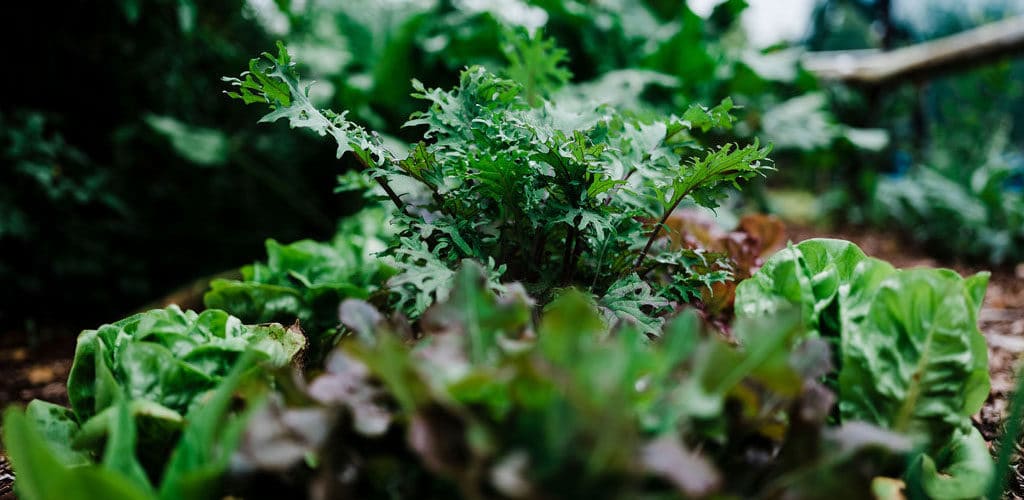One of the most important features of the Witchcliffe Ecovillage master plan is the location of large community gardens at the heart of each residential cluster. These gardens will grow the bulk of fresh food for residents in the clusters, which is vital for a community wanting to minimise its reliance on food miles and fossil fuels. They will also function as community hubs: promoting friendship, neighbourliness, resource sharing and social resilience.
Volunteer gardening group
We have recently begun the exciting journey of growing our Ecovillage community by inviting future residents to participate in a regular gardening group in the demonstration garden next to the Sustainable Settlements office.
We have met twice since the last newsletter, and have formed a small but convivial group of keen gardeners and expert tea drinkers. Under the guidance of PB and Mark, our resident organic gardening and permaculture gurus, we have prepped, planted and weeded this season’s crop of garlic, planted out a few of our staple Autumn crops, including onions, beetroots, and cabbages, and harvested some abundant herbs, greens and sweet potatoes to take home. In between sorting garlic and trimming up onion seedlings, we have taken time to chat and get to know each other a little, and of course, enjoy a well-earned morning tea.
Ecovillage demonstration garden
If you’ve driven past the Ecovillage office lately, you’ll have noticed black weed mat laid out all over the front grassed area, which is slowly killing the kikuyu grass underneath by solarisation, a common organic method of weed control. This site is being developed into a soon to be NASAA certified organic market garden, which will be a model system that residents can apply in their larger community gardens in the Ecovillage clusters.
We are basing our veggie planting on Mel Bartholomew’s excellent square foot garden concept as it’s a very effective way of growing veggies in a community garden setting. Using a 30cm grid within our gardening beds, the idea is to stack groups of plants together in clusters instead of rows, to only plant what we can consume and share in a week, and to fill the beds successively. This avoids the boom or bust problems of “gardening by punnet” that we have all fallen into in the past, where enthusiastic gardeners end up with eight broccolis, eight cabbages and eight bunches of spring onions ready to eat one week, and then have to wait six weeks for the next lot of punnets to mature. We are combining this approach with a few “broadscale” beds where we are growing some of the bulk root crops like sweet potatoes and regular potatoes that take up a bit more space.
Visitors to the demo garden will also notice a few beds have been given over to a scaled down version of cover cropping. This is an old fashioned but effective organic gardening technique that grows interim grass and legume crops in fallow beds and then passes them through the bellies of beasts to return goodness to the soil for the next productive crop. For now, we are cutting our cover crops and feeding them to the worm farm and our chooks at home, but we plan to bring some guinea pigs on board to fulfil the function of tiny cows for us. Based on the results of our soil tests, we are also sourcing local inputs to make up some supplementary mixes to boost our soils, in addition to sowing green manures, kick starting the microbiology and making compost, all in preparation for spring planting.
If you are interested in joining us for a gardening group session, or would like to know more about the planned community gardens in the Ecovillage, please send an email to Michelle at [email protected]
Autumn garden workshop
Horticulturalist, Mark Tupman, ran a workshop in late April on how to boot up an Autumn garden. We had a great afternoon with 17 participants joining us at the Ecovillage’s office demonstration garden to soak up the glorious weather and learn pro tips from a horticultural master.
This was the first of many workshops to come, with the idea that we host at least one every season. We’re also keen to consider requests for future content, so please let us know if there’s something particular you’d like us to cover. The aim of the workshops is to impart knowledge and practical skills to future Ecovillage residents. However, we also want to play a role in developing a greater understanding of and appreciation for sustainability, reducing waste and growing your own food within the wider community.
A lot of people moving into the ecovillage won’t have much experience growing their own veggies, but don’t be concerned, we’ll be running regular workshops, and upon completion of each residential cluster, residents will be taught how to grow their own fruit and veggies by our expert team.

